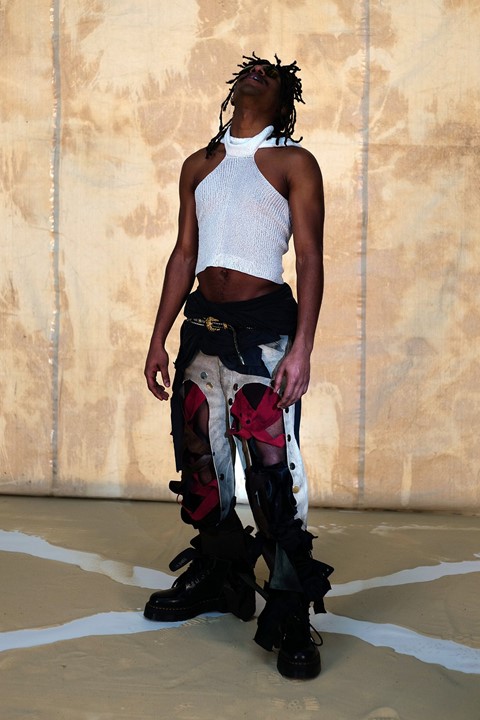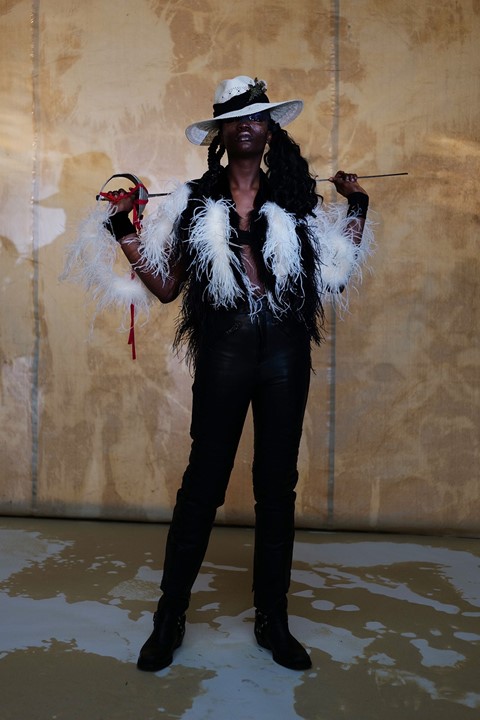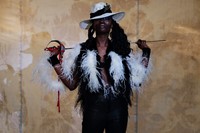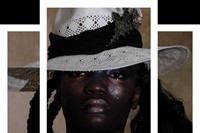Following his Fashion East debut, the Jamaican-Caymanian designer and Fashion East newcomer launches new images and a film, exclusively on AnOther
- Who is it? Jawara Alleyne is a Jamaican-Caymanian menswear designer based in London
- Why do I want it? His work challenges ancient and modern meanings of masculinity through the exploration of cultural mythology, inspired by his Caribbean heritage
- Where can I find it? Online at Fantastic Toiles and APOC Store
Who is it? Jawara Alleyne is among the new wave of bright young designers to join Lulu Kennedy’s Fashion East. A 2020 graduate of Central Saint Martins’ menswear course, Alleyne’s work challenges mainstream perceptions of masculinity by celebrating sensuality and dissecting cultural mythology. “We’ve found ourselves in a time where we need to re-navigate and that’s what I’m doing through my designs,” he tells AnOther, following his debut at London Digital Fashion Week. “It’s saying that we need to break away from what was, so we can think about what can be. For the past few years, my work has been centred around telling new stories for men and seeing where we can push that narrative to open new possibilities.”
Raised between Jamaica and the Cayman Islands, much of Alleyne’s creative inspiration is drawn from his upbringing – an influence that’s vividly portrayed in his designs. “Growing up the way I did gave me such a huge range of experiences and an understanding of culture and subculture that really play a role in the way I approach, understand and reflect on my research. I think that’s what has given me the ability to take from my Caribbean experience, to speak with a point of view on fashion, design and identity.”

Alleyne’s artistic vision is something he discovered early on in his life. It began with a childhood passion for drawing, and then later developed into a love for fashion. His earliest memory is an image he drew for his grandmother of Sandy from SpongeBob Squarepants wearing a bikini (she still keeps it in her Bible). “I wasn’t good at portraits so I made each character different through their clothes,” he recalls. “I think that’s when I realised that I had an interest in fashion – around ten years old – since then it’s never stopped moving in that direction.”
When it comes to fashion heroes, Alleyne looks to many, each for different reasons. He’s obsessed with Vionnet’s understanding of poetry in draping, a skill he calls “genius”, and is inspired by Galliano and McQueen’s storytelling. He is also fascinated by Margiela’s use of philosophy. “Most designers select one thing to focus on, but for me that one thing is the relationship between draping for menswear, sustainability, examining masculinity from a sociological point of view and storytelling that brings forth a new design language.”
Why Do I Want It? Alleyne’s Autumn/Winter 2021 debut is a continuation of his MA graduate collection titled Self-Made Man. It explores both ancient and modern ideas of masculinity through a dozen sculptural designs. “I was examining the archetype of the self-made man as it’s taken on different meanings throughout time and is linked to how masculinity is presented in the media,” Alleyne explains. “It’s been used to describe someone whose success lies within the individual themselves, not in outside conditions. It’s further been used to describe the age of manufacturing which took us into the age of self-help.”
Alleyne’s portrayal of the self-made man represents the “every man for himself” myth – a popular ideology in our capitalist world. “Even today the legacy of that idea of the self-made man persists in the digital age of individualism,” he explains. “We’re in the age of identity politics and fashion plays a large role in that.” For Alleyne, the contemporary self-made man is someone who “understands that we have to start examining our sense of self in order to create a new way of thinking. We want society to change but that won’t happen unless individuals change and my collection is about envisioning that man.”
Alleyne’s aim is to use fashion to put forth a new energy of optimism, and to expand on the story he has started to tell. “We do need to be inspired to create the next version of who we want to be,” he says. “I think the time we’re spending at home [during lockdown] is exactly what we need to refresh our creative energy and I’m hoping we can come out on the other end ready to actively create the systems we want to live in.”
Where can I find it? Online at Fantastic Toiles and APOC Store.






